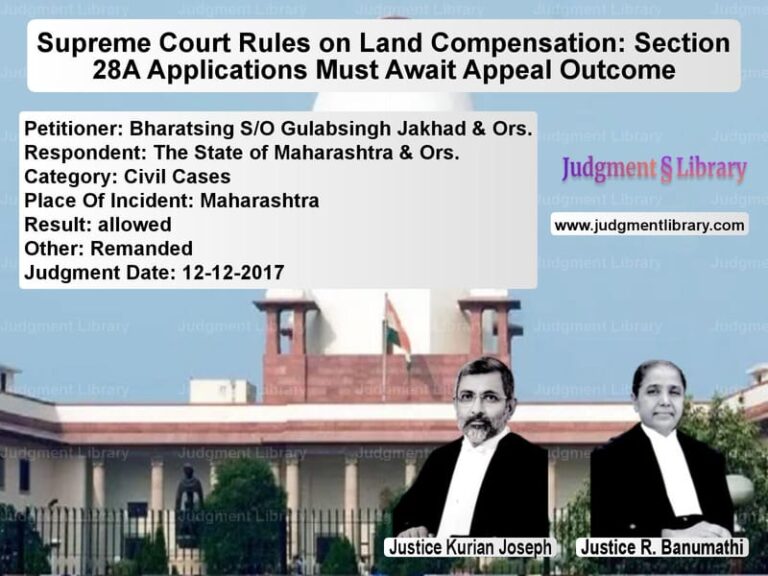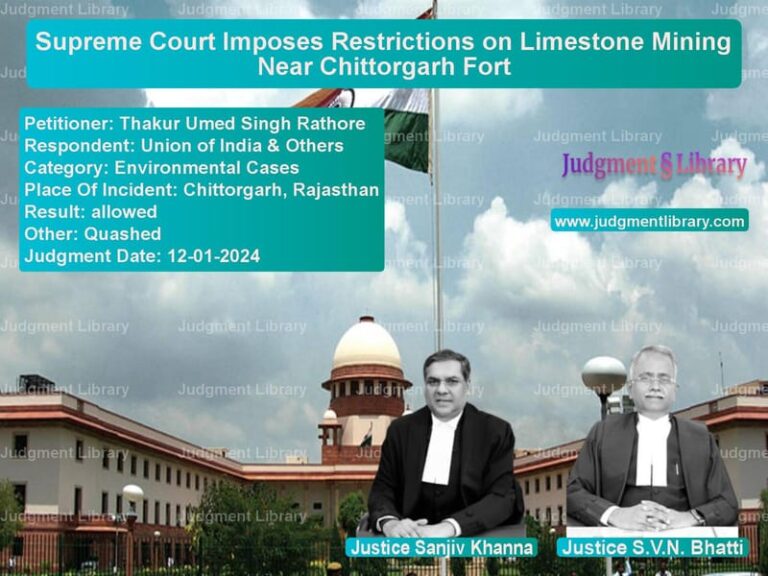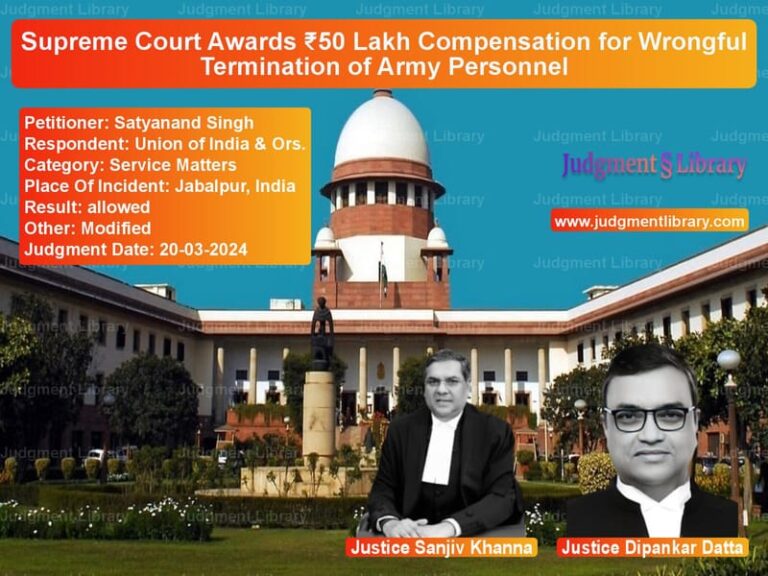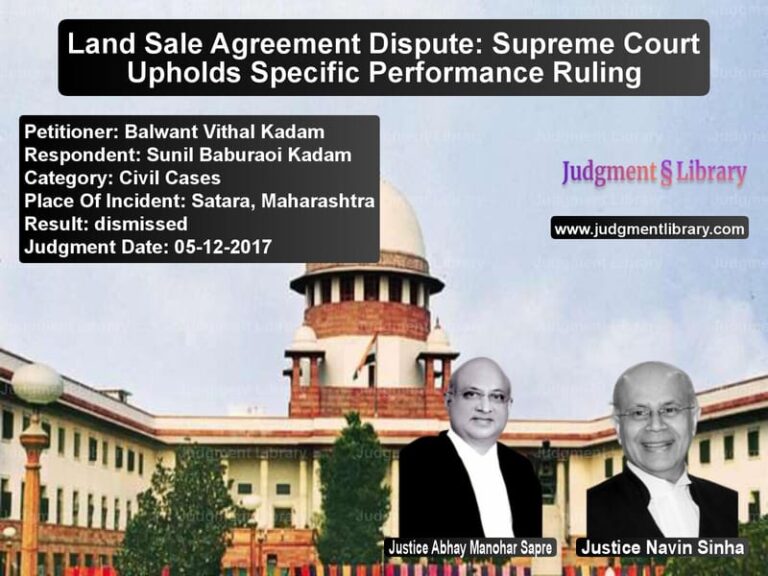Supreme Court Restores Corruption Case Against Punjab Official, Sets Aside High Court Order
In a crucial decision, the Supreme Court of India in The State of Punjab v. Hari Kesh has set aside the judgment of the Punjab and Haryana High Court, which had quashed the sanction order for prosecution under the Prevention of Corruption Act, 1988. The apex court ruled that the trial must proceed and that the question of sanction should be determined through evidence during trial, not prematurely by the High Court.
Background of the Case
The case concerns corruption allegations against Hari Kesh, a public servant accused of accepting bribes in violation of Sections 7 and 13(2) of the Prevention of Corruption Act, 1988. The case stemmed from an FIR (No. 02) registered on January 10, 2024, by the Vigilance Bureau in Patiala, Punjab.
During the investigation, the prosecution obtained a sanction order for prosecution dated November 19, 2018. However, the accused challenged this order in the Punjab and Haryana High Court, arguing that the sanction was granted by an incompetent authority. The High Court ruled in favor of the accused on May 20, 2019, quashing the sanction and the related criminal proceedings.
Key Legal Issues
- Whether the High Court could quash the sanction order when the trial had already commenced.
- Whether the alleged incompetency of the sanctioning authority was a valid reason for setting aside the entire prosecution.
- Interpretation of Section 19 of the Prevention of Corruption Act regarding procedural errors in granting sanction.
Arguments by the Appellant (State of Punjab)
- The prosecution had already examined seven witnesses at trial before the High Court intervened.
- The accused’s objection regarding the competence of the sanctioning authority should have been raised at an earlier stage.
- The High Court failed to consider that under Section 19(3) of the Prevention of Corruption Act, procedural errors in sanctioning do not vitiate the trial unless they cause a failure of justice.
- The judgment in State of Karnataka, Lokayukta Police v. S. Subbegowda (2023 SCC Online SC 911) established that such issues should be determined at trial, not through pre-trial quashing of the sanction.
Arguments by the Respondent (Hari Kesh)
- The sanction order was invalid because the competent authority had initially refused to grant permission.
- The subsequent approval was obtained from an officer who lacked the legal authority to grant sanction.
- Since the sanction was defective, the entire criminal prosecution should be nullified.
- Section 19 of the Prevention of Corruption Act does not override the fundamental requirement of a valid sanction.
Supreme Court’s Observations
- “The combined reading of Section 19(3) and (4) makes it clear that an absence or defect in sanction does not automatically vitiate the trial unless it results in a failure of justice.”
- “The High Court quashed the sanction order without considering whether the accused had suffered any real prejudice.”
- “When the trial court has already proceeded and multiple witnesses have been examined, intervention at this stage is unwarranted.”
- “Under the explanation to Section 19(4), the competency of the sanctioning authority is considered an error that should be addressed during trial, not through pre-trial quashing.”
Final Judgment
- The Supreme Court set aside the Punjab and Haryana High Court’s decision that had quashed the sanction order.
- The corruption case against the accused was restored and will continue before the Special Court in Sangrur.
- The Court clarified that whether the sanctioning authority was competent should be determined as part of the trial.
- The Supreme Court emphasized that it had not expressed any opinion on the guilt or innocence of the accused.
Conclusion
This decision reinforces the principle that courts should not interfere with ongoing criminal trials on technicalities related to sanction orders unless there is clear evidence of a failure of justice. The ruling ensures that procedural objections do not obstruct the fair prosecution of corruption cases against public servants.
Petitioner Name: The State of Punjab.Respondent Name: Hari Kesh.Judgment By: Justice Bela M. Trivedi, Justice Prasanna B. Varale.Place Of Incident: Sangrur, Punjab.Judgment Date: 07-01-2025.
Don’t miss out on the full details! Download the complete judgment in PDF format below and gain valuable insights instantly!
Download Judgment: the-state-of-punjab-vs-hari-kesh-supreme-court-of-india-judgment-dated-07-01-2025.pdf
Directly Download Judgment: Directly download this Judgment
See all petitions in Fraud and Forgery
See all petitions in Bail and Anticipatory Bail
See all petitions in Judgment by Bela M. Trivedi
See all petitions in Judgment by Prasanna Bhalachandra Varale
See all petitions in allowed
See all petitions in Remanded
See all petitions in supreme court of India judgments January 2025
See all petitions in 2025 judgments
See all posts in Criminal Cases Category
See all allowed petitions in Criminal Cases Category
See all Dismissed petitions in Criminal Cases Category
See all partially allowed petitions in Criminal Cases Category







